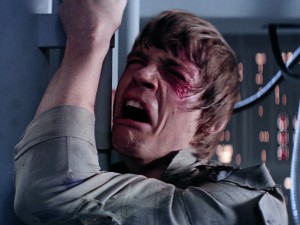
So the hero gets the call to adventure, initially turns it down, meets a mentor figure who gives him some sort of supernatural aid, crosses the threshold of adventure, faces a series of tests and trials, loses his mentor, experiences the power of love…and then what? Well, if we’re playing the hero’s journey straight, the next step is atonement with the father, also known as well done son guy.
Before passing the ultimate test, the hero must first confront the force that holds the ultimate power in his life. This is often some sort of father figure, though it can also be a close friend or a rival. Often, the main reason the hero set out on the journey in the first place was because he felt a need to prove himself and gain the respect of this figure. For that reason, the climax often involves some sort of reconciliation or closure between these two characters.
In discussing this trope, Joseph Campbell said the following:
Atonement consists in no more than the abandonment of that self-generated double monster—the dragon thought to be God (superego) and the dragon thought to be Sin (repressed id). But this requires an abandonment of the attachment to ego itself, and that is what is difficult. One must have a faith that the father is merciful, and then a reliance on that mercy…
The problem of the hero going to meet the father is to open his soul beyond terror to such a degree that he will be ripe to understand how the sickening and insane tragedies of this vast and ruthless cosmos are completely validated in the majesty of Being. The hero transcends life with its peculiar blind spot and for a moment rises to a glimpse of the source. He beholds the face of the father, understands—and the two are atoned.
While this may, on the surface, seem just like a simple “I’m proud of you” moment, the full significance goes much deeper. This is the moment where the hero finally receives validation for all his struggles, where he realizes that everything he’s been through has been worth it. It’s a tremendous moment, and an important element of any story that follows the hero’s journey paradigm.
The reason why the hero’s journey resonates so strongly throughout our culture is because it powerfully and effectively fulfills one of the major purposes of all story–to help us better understand ourselves, the world we live in, and what it means to be human. For that reason, this trope is one of the things that can either make or break a story. When done well, it can turn the work into a classic. When done poorly, it can make us wish we had our money back.
I’d talk about this trope in my own work, but I don’t want to give any spoilers. In Bringing Stella Home, there’s something of a gender inversion, as the title would imply. In fact, there’s a gender inversion in Star Wanderers as well, though you’ll have to wait until part IV to read it. In Desert Stars, it’s more of a personal moment, but the whole novel is a lot more intimate and personal than a save the world type of adventure.
1 comment